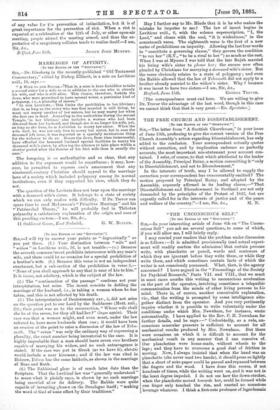[To THE EDITOR OF THE "SPFCTATOR.") SIR,—I will try to
answer your points as " dogmatically " as you put them. (1.) Your distinction between " wife " and " widow " in Leviticus xviii., 16, is not tenable :—(a.) Because the seventh commandment prohibits intercourse with any man's wife, and there could be no occasion for a special prohibition of a brother's wife. (b.) Because this verse is not an independent enactment, but a sub-section of the prohibition in verse 5,— " None of you shall approach to any that is near of kin to him." It is incest, not adultery, which is the subject of the law.
(2.) The "continuation of the passage" confirms not your interpfetation, but mine. The incest consists in defiling the marriage of the husband, i.e., in taking a woman whom he has taken, and this is not affected by his death.
(3.) The interpretation of Deuteronomy xxv., 5, did not arise on the question put to our Lord by the Sadducees (Matt. xxii., 24); their point was as to the resurrection, "Whose wife shall she be of the seven, for they all had her P" (i'lrxes again). Their case was that a woman might, and even must, under the law referred to, have more husbands than one ; it would have been an evasion of the point to raise a discussion of the law of Yebamoth. The " seven " was only the ordinary way of expressing a plurality, the exact number being immaterial to the case. It is highly improbable that a man should leave seven own brothers capable of marrying his widow, and no such extravagance is stated. If the case was put in Greek (as we have it), ciasxvic would include a near kinsman ; and if the law was cited in Hebrew, Yebam has the same latitude, as shown in the marriage of Boaz and Ruth.
(4.) The Rabbinical gloss is of much later date than the Scripture. That the Levitical law was "generally understood" to mean what it plainly says, is shown by no such marriage being recorded after its delivery. The Rabbis were quite capable of inventing glosses on the Decalogue itself ; "making the word of God of none effect by their traditions."
May I further say to Mr. Hinde that it is he who makes the mistake he imputes to me ? The law of incest begins in Leviticus xviii., 6, with the solemn superscription, "I, the Lord," and closes with the seal, "it is wickedness," in the seventeenth verse. The eighteenth verse is the first of a newseries of prohibitions on impurity. Allowing the lastfour words to "constitute a governing clause," they govern the condition "to vex her" (R.V., "to be a rival to her ") as much as the rest When I was at Mysore I was told that the late Rajah married his living wife's sister to please her; the excuse now often pleaded by Christians for marrying a deceased wife's sister. But the verse obviously relates to a state of polygamy ; and eventhe Rabbis allowed that the law of Yebamoth did not apply to a brother already married to the widow's sister. Why ? becauseit was incest to have two sisters.-1 am, Sir, &c., Beeford, June 15th. GEORGE TREVOR.
rThe correspondence must end here. We are willing to give Dr. Trevor the advantage of the last word, though in this casewe cannot think that that is very great. —En. Spectator.]


































 Previous page
Previous page